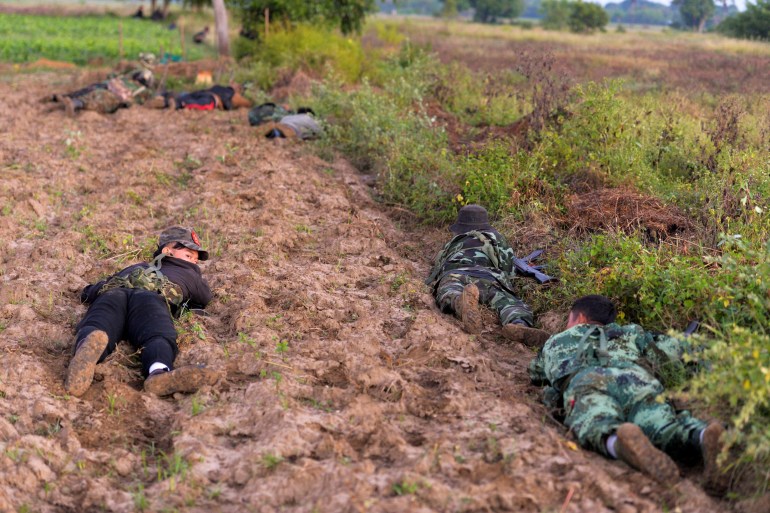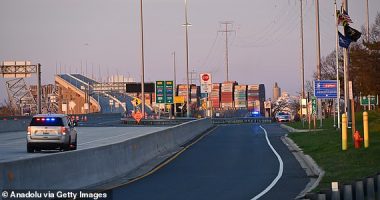The Myanmar military will mark Armed Forces Day on Wednesday with its usual parade in the purpose-built capital of Naypyidaw. Thousands of armed troops from all three branches will march in formation, while tanks roll through the streets and fighter jets screech overhead.
But the show of strength will do little to paper over the reality – Myanmar’s military is at its weakest point in decades. Perhaps not since 1949, when the Karen National Union captured the Insein neighbourhood, in the then-capital Yangon, has the military been so humiliated on the battlefield.
Commander-in-Chief Senior General Min Aung Hlaing, who seized power in a 2021 coup, is expected to lead the festivities, despite presiding over the recent loss of huge swathes of territory and facing unprecedented calls for him to step down, even within pro-military circles.
“He has become the most unpopular commander-in-chief among [the] rank and file in Tatmadaw history,” said Min Zaw Oo, the executive director at the think tank Myanmar Institute for Peace and Security, using the formal name for the Myanmar military.
Min Aung Hlaing seized power after Aung San Suu Kyi led the National League for Democracy to a landslide election victory in 2020, with the military then killing hundreds of protesters who took to the streets calling for them to go. The bloody crackdowns inspired an armed revolt, both in the long-restive borderlands where ethnic minorities have fought for political autonomy for decades and in the previously peaceful heartland where the Bamar ethnic majority live.

The widespread armed resistance has left the military overstretched and undermanned; a situation exposed in late October when the Three Brotherhood Alliance launched a stunning offensive known as Operation 1027. The trio of ethnic armed groups seized large chunks of territory in northern Shan and southern Chin states as well as in Rakhine State, where fierce fighting continues to rage.
“Operation 1027 and subsequent operations showed that the Myanmar military was much weaker than thought,” said Richard Horsey, a senior Myanmar adviser at the International Crisis Group. “A collapse of the military doesn’t appear imminent, however. The generals’ backs are to the wall, and they likely see no real alternative to fighting on,” he said, adding the same is true for Min Aung Hlaing on a personal level, who “appears determined to tough things out”.
While the Brotherhood has kept some distance from the broader pro-democracy uprising, other armed groups launched their own offensives in the wake of Operation 1027, seemingly hoping to capitalise on the military’s vulnerability.
The People’s Defence Force and Karenni Nationalities Defence Force, both formed after the coup, seized towns and territory in Sagaing Region and Kayah State respectively, with the KNDF now fighting on the streets of the state capital. The Kachin Independence Army – formed in 1961 and today closely aligned with the post-coup movement – supported the fighting in Sagaing and launched a major coordinated offensive of its own in Kachin State earlier this month.
Min Zaw Oo said the military is “losing ground” in northern Shan, Rakhine and Kachin, where powerful ethnic armed groups are leading the charge. But it is a different story in Sagaing, where the military has managed to claw back some major towns lost to resistance groups formed after the coup.
“The pro-democracy opposition is still weakly armed and fragmented,” Min Zaw Oo said, explaining that they are largely dependent on the more established ethnic armed groups.
Horsey agrees.
“The military’s most powerful foes are the larger ethnic armed groups and they are very unlikely to want to march on Naypyidaw as they have their own priority objectives closer to home,” he said. “Post-coup resistance forces would be motivated to take the fight to the capital, but they lack the necessary firepower, coordination and experience.”
The spectacular fighting in northern Shan fizzled out after the Brotherhood signed a China-brokered ceasefire with the military, allowing the groups to consolidate control over their newly-claimed territories.
But KNDF Chairman Khun Bedu said the ceasefire has also allowed the military to “consolidate their power and continue to maintain the central area”.
He blamed Beijing’s continued support for propping up the military and the military’s more advanced technology. China and Russia have both provided arms to the military since the coup, including fighter jets. Khun Bedu said recently that the military has also been more frequently using drones rigged with explosives in kamikaze-style attacks or to drop bombs on resistance positions.
Maintaining cohesion
As a result of the recent defeats, Min Aung Hlaing has faced highly unusual public criticism from military officers and supporters. A major-general in the air force called him the “worst leader in the history of the military”, while ultranationalists called for him to step down during rallies in the aftermath of Operation 1027.
But three years after overthrowing a hugely popular civilian government, presiding over unprecedented territorial losses, a calamitous economic collapse and seemingly unable to protect supporters from assassination, the bigger story may be how the military has managed to hold together this long.
There have only been two unit-level defections – both ethnic militias that were loosely under military command but already operated with a high degree of autonomy.
“Despite facing widespread opposition, the military has maintained its cohesion by projecting strength externally, a common strategy among military institutions worldwide,” said activist Thinzar Shunlei Yi, who works with People’s Goal, an organisation that encourages defections from the military. However, she said this perception of strength is being challenged by recent events.
She said the military’s historic “indoctrination techniques are deeply rooted in nationalism and religious ideologies”, which are increasingly rejected by ethnic minorities and pro-democracy groups, leaving “soldiers and their families feeling disoriented amidst shifting societal paradigms”.
“Defecting soldiers, particularly the younger generation, often cite disillusionment with the military’s actions rather than support for the revolution,” she added.

Khun Bedu said it is difficult for soldiers to defect because their families are essentially held captive in military settlements and lower-ranking troops are closely monitored by their superior officers.
“We ask them a lot, we try to reach them… but the number of defections is getting not very high,” he said
The bitterness of the conflict, including resistance forces targeting military supporters and families, intended to heap pressure on the military’s supporters, may have actually made disintegration less likely. A 2022 ICG report argued that the dreaded Pyusawhti paramilitary militias were formed organically by pro-military civilians who feared assassination by resistance groups.
Min Zaw Oo said that after Brotherhood member the Arakan Army (AA) allegedly slaughtered military families attempting to flee Kyauktaw in Rakhine, “we have observed no cases of mass surrender” there, suggesting soldiers now see fighting to the death as the only option.
“In all overrun bases after that incident, the AA captured dead bodies of [the] highest ranking officer, as high as colonel, because they refused to surrender,” he said.
Meanwhile, the military is increasingly relying on air strikes and remote artillery strikes to hit back at areas now outside of its control.
“The military is on the back foot across the country, unable to defend territory or launch effective counterattacks in all but a few top priority locations. It is weak but it is fighting on,” said Horsey. “It can’t win at the present moment but it still has deadly firepower that it is ready to use indiscriminately,” including against civilian targets.
Against the backdrop of bloodshed and carnage, the ruling military has enacted a military draft, planning to forcibly recruit tens of thousands from a population that largely despises it. Horsey said this may have been “partly a political move” by Min Aung Hlaing, to show other senior officers that he is “taking action to address military weaknesses, even if conscription is unlikely to be effective in that regard”.
The effort has quickly devolved into chaos. There have been reports of suicide among those drafted, and a renewed exodus abroad. Some local military administrators tasked with carrying out the draft have been assassinated, while others have resigned en masse.

But despite Min Aung Hlaing’s many failures, it is unclear what would need to happen to precede an institutional collapse or an internal coup.
“Min Aung Hlaing has many detractors and is clearly a weak leader, but there are no obvious signs of factionalism within the top brass,” Horsey said. “He has had 13 years to position allies in senior positions and anyone who moved against him would risk paying a heavy price.”
Min Zaw Oo said the military has a “strong tradition not to rebel against their seniors”, which is a “lifeline” for Min Aung Hlaing but not one that is guaranteed to keep him afloat forever.
“We should not be surprised if someone decides to break the organisational norm,” he said.
Read More: World News | Entertainment News | Celeb News
Aljazera










